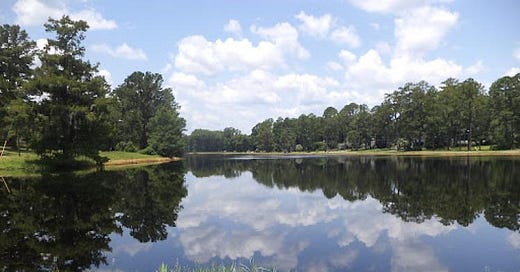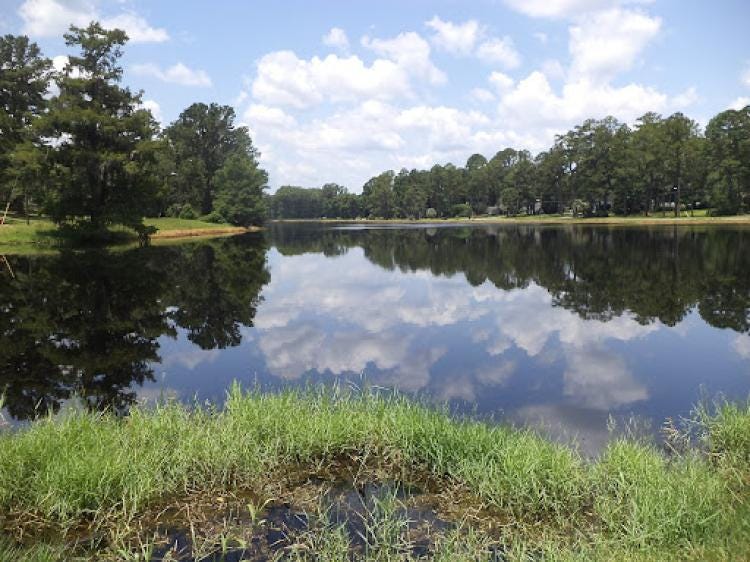Today In Black History: Georgia's Lake Lanier covers a historical Black town
Oscarville was decimated by white supremacists in 1912.
Issue #692 Today In Black History, Tuesday, August 6, 2024
Did you know you can listen to each “We Are Speaking” post on the Substack App? Download the app!
Help us to reach our August 2024 goals: +250 total new subscribers, including +100 new paid subscribers:
Please share and subscribe to help us grow our publication.
Who are your “Fav Five” who would enjoy “We Are Speaking?” Send them the link!
If you like us, REALLY like us, please click the “Like” button at the end of this post!
We appreciate your support!
Today’s Black History WOW!
The beautiful Lake Lanier in Georgia covers up the destruction of the Black town of Oscarville.
Oscarville, Georgia, a once-thriving Black community is now submerged beneath the waters of Lake Lanier. This story is often overshadowed by the glistening allure of one of Georgia's most popular recreational lakes.
Oscarville, located in Forsyth County, Georgia, was a prosperous Black community in the early 20th century. Established post-Civil War during the Reconstruction era, Oscarville became a symbol of Black empowerment and self-sufficiency. The town thrived with successful farms, schools, churches, and businesses, exemplifying the potential for Black prosperity in the face of systemic oppression and Jim Crow laws.
As also happened to successful Black towns in the early 20th century, the progress of Oscarville faced a catastrophic interruption in 1912 due to a brutal and racist event. Accusations of the rape of a white woman led to the lynching of two Black teenagers, ushering in a wave of terror against the Black community. White mobs, fueled by racial hysteria and hatred, violently expelled over 1,000 Black residents from Forsyth County, including those from Oscarville. Homes and businesses were burned, and properties were seized, leading to a significant loss of Black-owned wealth and heritage.
Fast forward to the mid-20th century, the U.S. government, under the Army Corps of Engineers, embarked on a project to create a man-made lake to control flooding and provide hydroelectric energy. The chosen site was the Chattahoochee River, encompassing parts of Forsyth County, including the land where Oscarville once thrived.
In the 1950s, the controversial construction of Buford Dam began, leading to the formation of Lake Lanier. The project required the flooding of vast areas, including the remnants of the ghost towns left behind from the racial cleansing of 1912. By 1956, Lake Lanier was filled, permanently submerging the land that once echoed with the vibrant life of Oscarville.
For decades, the story of Oscarville remained largely untold, buried under both water and the narrative of progress. However, recent efforts by historians, academics, and descendants of Oscarville's original residents have brought renewed attention to this submerged history.
As people enjoy the recreational opportunities provided by Lake Lanier, it is essential to remember that beneath its tranquil surface lies a hidden history of struggle, displacement, and perseverance.
Today In Black History
In 1854, Congress passed the Confiscation Act that authorized the appropriation of property, including slaves, of rebel slaveholders.
In 1861, Lagos, Nigeria was annexed by the British.
In 1962, Jamaica became an independent dominion within the British Commonwealth.
In 1965, President Lyndon Johnson signed the Voting Rights Bill, which authorized the suspension of literacy and the sending of Federal examiners into the South.
Our paid subscribers are encouraged to discuss this post in our W.A.S. Chat Community.
Join Pamela Hilliard Owens’s subscriber chat
Available in the Substack app and on the web
You are also welcome to view “We Are Speaking” in Substack Notes. You can also read other Substack publications without subscribing to them when you join Notes.







